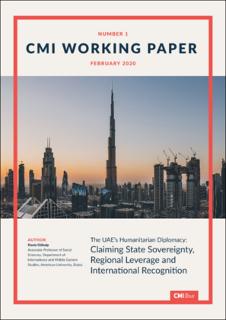| dc.contributor.author | Gökalp, Deniz | |
| dc.date.accessioned | 2020-04-21T16:00:13Z | |
| dc.date.available | 2020-04-21T16:00:13Z | |
| dc.date.issued | 2020-02-01 | |
| dc.identifier | oai:www.cmi.no:7169 | |
| dc.identifier.citation | Bergen: Chr. Michelsen Institute (CMI Working Paper WP 2020:1) 11 p. | |
| dc.identifier.isbn | 978-82-8062-742-1 | |
| dc.identifier.issn | 0804-3639 | |
| dc.identifier.uri | https://hdl.handle.net/11250/2651943 | |
| dc.description.abstract | The United Arab Emirates (UAE) became the world’s third-largest donor of humanitarian aid relative to Gross National Income in 2016. The country was among the top five humanitarian assistance state-donors in the world in terms of US dollars in 2018. There has been a constant growth of the share of humanitarian aid as part of the country’s overall foreign aid within the last few years, and humanitarian aid reached to 18 percent of the UAE’s overall foreign aid in 2018. The UAE has complied with international standards for transparency and accountability since 2010 and has reported its aid flows, including development aid and humanitarian aid, to OECD-DAC. In doing so, it is “the first country outside the DAC’s membership to report in such detail”. | |
| dc.language.iso | eng | |
| dc.publisher | Chr. Michelsen Institute | |
| dc.relation | CMI Working Paper | |
| dc.relation | WP 2020:1 | |
| dc.relation.ispartof | CMI Working Paper | |
| dc.relation.ispartofseries | CMI Working Paper WP 2020:1 | |
| dc.relation.uri | https://www.cmi.no/publications/7169-the-uaes-humanitarian-diplomacy-claiming-state-sovereignty | |
| dc.subject | Humanitarian Diplomacy | |
| dc.subject | United Arab Emirates | |
| dc.subject | Foreign Policy | |
| dc.subject | Humanitarian Enterprise | |
| dc.subject | International Relations | |
| dc.title | The UAE’s Humanitarian Diplomacy: Claiming State Sovereignty, Regional Leverage and International Recognition | |
| dc.type | Working paper | |
